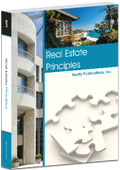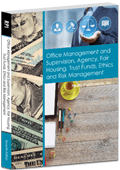This article is part of an ongoing series covering violations of real estate law. Here, the Department of Real Estate (DRE) revoked the California real estate license of a broker who commingled their client’s funds with their personal account and used themselves, operating under an unapproved fictitious business name, as the escrow service without informing the client.
In December 2021, the California Department of Real Estate (DRE) decided by order hearing to revoke the license of Faith Elizabeth Koby, a broker since 1982 operating out of Banning, California. The decision became effective January 2022.
In 2016, a seller entered into a listing agreement with Koby to sell their residential property. Koby only had one fictitious business name licensed with the DRE, “Koby Financial Services.” Nonetheless, she used an unapproved fictitious business name “Koby Financial” to conduct the sale.
In 2019, Koby submitted a purchase agreement to the seller on behalf of a buyer making a cash offer. Koby used more unapproved fictitious business names, including “Koby Ranch” as the seller’s brokerage firm, and “Koby Real Estate” for the buyer’s brokerage firm on the purchase agreement, acting as a dual agent for the seller and the buyer.
The seller intended to submit a counteroffer. However, Koby failed to provide the seller with a copy of the counteroffer.
Meanwhile, Koby provided the buyer with a copy of a different purchase agreement than the one they had entered into with a different date and an extra $10,000 tacked onto the purchase price. The second purchase agreement also called for a $5,000 good faith deposit. The buyer never initialed or signed the purchase agreement and accompanying disclosure forms.
The prospective buyer gave Koby a total of $29,000 toward the purchase of the property between March and April 2019.
Koby provided the buyer with escrow instructions soon after, using herself as the escrow agent in addition to acting as a dual agent in the transaction. She used a fourth unapproved fictitious business name “Koby Financial Escrow” while also being unlicensed by the Department of Financial Protection and Innovation (DFPI) as an escrow agent. She did not inform either the buyer or seller that she was acting as the escrow agent for the sale.
The buyer and seller both became frustrated with Koby since she did not return communications. Both also became suspicious since she requested cash deposits. The seller communicated to Koby the buyer wanted to cancel the sale. Soon after, Koby sent the buyer a cancellation request, asking them to sign and return it. The letter stated the seller had the right to retain 3% of the agreed-upon sales price. The buyer refused to sign the cancellation agreement since they no longer trusted her.
The transaction was cancelled in August 2019. Koby failed to provide a written cancellation of contract to the seller and the buyer. Although she maintained in an October 2019 letter that she would return the buyer’s deposit, she only returned $5,000 of the $29,000 owed to them.
Both the buyer and seller submitted complaints to the DRE about the transaction, prompting the DRE to complete an audit on Koby’s books and records.
The DRE’s investigation uncovered Koby violated real estate law and regulations when she:
- failed to properly disburse trust funds to the prospective buyer after cancellation of the transaction [Calif. Business & Professions Code §10145(a); DRE Regulations §2950];
- commingled trust funds received from the buyer with her personal bank account, and disbursed funds from the same account for her personal expenses [Bus & P C §10145, §10176(e); DRE Regs. §2832, §2951];
- used a general account instead of a trust account to conduct broker escrow activities [Bus & P C §10145; DRE Regs. §2832, 2951];
- used an unapproved fictitious business name to handle escrow for the transaction without obtaining a license [Bus & P C §10159.5; DRE Regs. §2731];
- failed to notify participants in writing that she had an interest as an owner of the escrow agency [DRE Regs. §2950(h)];
- failed to maintain or provide requested records relating to her escrow activities during the audit period [Bus & P C §10148; DRE Regs. §2950(d)]; and
- used fictitious business names without a license, demonstrating willful, negligent and incompetent treatment of real estate law. [Bus & P C §10177(d), §10177(g)]
The DRE’s investigation and enforcement costs totaled $7,957, of which Koby is subject to pay.
Related article:
Brokerage Reminder: Disbursement of funds when a transaction fails
Be truthful with trust funds
Trust funds are held by brokers for safekeeping and may not be treated casually.
Brokers have recordkeeping and accounting requirements imposed on them when they receive, transfer or disburse trust funds. [See RPI e-book Real Estate Principles Chapter 6]
Funds received in the form of cash or check made payable to the broker for their services are to be:
- deposited into the broker’s trust account;
- held undeposited as instructed; or
- endorsed and handed to others entitled to the funds.
Trust funds received in the form of checks or cash may only be used for expenditures authorized and incurred for the benefit of the owner of the funds.
Further, the broker is required to regularly account to the owner on the status, expenditure and location of the trust funds, called an owner’s statement.
Prior to the end of the third business day following the day the broker received negotiable trust funds, the broker needs to deposit the trust funds:
- with the person or escrow depository entitled to the funds; or
- in a trust account maintained by the broker at a bank or other state-recognized depository. [Bus & P C §10145; DRE Regs. §2832(a)]
When a broker deposits trust funds into an account used to receive and disburse personal or business funds, the broker has improperly commingled the funds. [See RPI e-book Real Estate Trust Funds, Chapter 4]
Similarly, improper commingling occurs when the broker places or leaves personal funds in a trust account. [Stillman Pond, Inc. v. Watson (1953) 115 CA2d 440]
Related Video: Word-of-the-Week: Trust accounts
Click here for more information on managing trust accounts.
Except to the limited extend authorized by the DRE, commingling is always improper.
A broker is only permitted to commingle personal or business funds with trust funds in the following two authorized situations:
- The broker may maintain a deposit of up to $200 of their own funds in the trust account to cover bank service charges on the account; and
- Fees or reimbursements for costs due the broker from the trust funds may remain in the trust account for up to 25 days before being disbursed to the broker. [DRE Regs. §2835]
The improper commingling of trust funds exposes the broker to a complaint and revocation or suspension of their license. [Bus & P C §10176(e)]
A broker who uses funds in any way not authorized by the owner may be held guilty of embezzlement. [Calif. Penal Code §506; See RPI e-book Real Estate Trust Funds, Chapter 6]
Related Video: Maintaining Trust Account Integrity
Click here for more information on trust account integrity.
Want to learn more about properly managing, receiving, depositing, holding and disbursing trust funds? Click an image below to download the RPI books cited in this article.
















